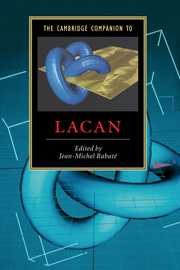Book contents
- Frontmatter
- 1 Lacan’s turn to Freud
- 2 The mirror stage: an obliterated archive
- 3 Lacan’s myths
- 4 Lacan’s science of the subject: between linguistics and topology
- 5 From the letter to the matheme: Lacan’s scientific methods
- 6 The paradoxes of the symptom in psychoanalysis
- 7 Desire and jouissance in the teachings of Lacan
- 8 Lacan and philosophy
- 9 Lacan’s Marxism, Marxism’s Lacan (from Žižek to Althusser)
- 10 Ethics and tragedy in Lacan
- 11 A Lacanian approach to the logic of perversion
- 12 What is a Lacanian clinic?
- 13 Beyond the phallus: Lacan and feminism
- 14 Lacan and queer theory
- 15 Lacan’s afterlife: Jacques Lacan meets Andy Warhol
- Further reading
- Index
- Series List
15 - Lacan’s afterlife: Jacques Lacan meets Andy Warhol
Published online by Cambridge University Press: 28 May 2006
- Frontmatter
- 1 Lacan’s turn to Freud
- 2 The mirror stage: an obliterated archive
- 3 Lacan’s myths
- 4 Lacan’s science of the subject: between linguistics and topology
- 5 From the letter to the matheme: Lacan’s scientific methods
- 6 The paradoxes of the symptom in psychoanalysis
- 7 Desire and jouissance in the teachings of Lacan
- 8 Lacan and philosophy
- 9 Lacan’s Marxism, Marxism’s Lacan (from Žižek to Althusser)
- 10 Ethics and tragedy in Lacan
- 11 A Lacanian approach to the logic of perversion
- 12 What is a Lacanian clinic?
- 13 Beyond the phallus: Lacan and feminism
- 14 Lacan and queer theory
- 15 Lacan’s afterlife: Jacques Lacan meets Andy Warhol
- Further reading
- Index
- Series List
Summary
Jacques Lacan is a thinker and clinician whose apprehension of recording and broadcast media allows him to live on posthumously with the pop star status he gained in post-war Parisian intellectual life. He is not only a serious rival to the official heirs of Freud, but has emerged as a rival of that other superstar, Jean-Paul Sartre. The history of his exclusion (or excommunication) from the International Psychoanalytic Association, and his subsequent notoriety is crucial for the theorization of his reception in Anglophone academia: there is an aura of transgression, or the smell of sulfur surrounding the sovereignty of his actions and thinking. His insistence on the signifier is key to an undoing of a humanist hermeneutics that swaddled more orthodox receptions of Freud. In addition, Lacan's interest in cybernetics seems to anticipate the plague of questions raised by technological progress. The reactions to his deviation from psychoanalytic orthodoxies revealed the religious fervor with which the guardians of Freudianism tried to protect their territory. Today, Lacan's work continues to teach us lessons, not only about psychoanalysis, but about media and history as well.
Playing the master on the airwaves allowed for Lacan to perform as both charlatan and master – consider his performance in Télévision: his analytic attitude seemed like a posture of pure provocation of his more conservative colleagues. In his pedagogical performances, Lacan demonstrated that all forms of inter-subjectivity, whether mediated by transference or other forms of telecommunication, are based upon a bewitching mirage of reciprocity or mutual understanding.
- Type
- Chapter
- Information
- The Cambridge Companion to Lacan , pp. 253 - 271Publisher: Cambridge University PressPrint publication year: 2003



